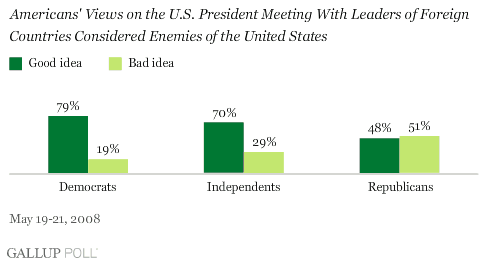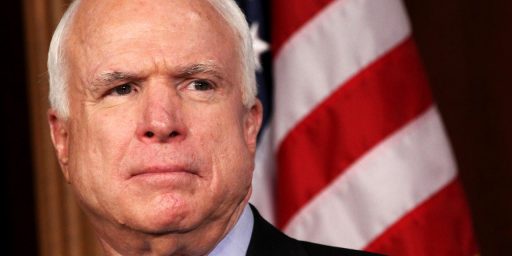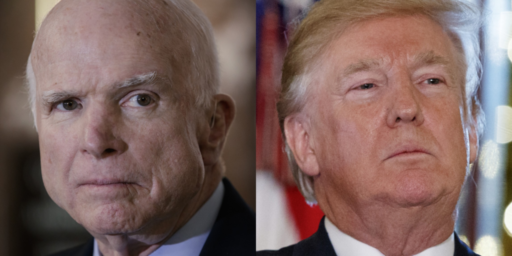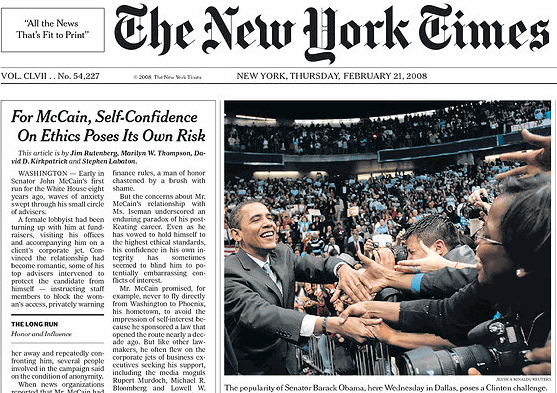Americans Favor President Meeting With U.S. Enemies
A new Gallup poll shows that two thirds of Americans “believe the president of the United States should meet with the leaders of countries that are considered enemies of the United States.”

Lydia Saad, a friend of the family, analyzes this, reasonably enough, in terms of the 2008 election:
The issue of using presidential diplomacy with U.S. enemies distinguishes Barack Obama from the presumptive Republican presidential nominee, John McCain, and even from his opponent for the Democratic nomination, Hillary Clinton.
[…]
McCain may eventually persuade more Americans that there is nothing for the president of the United States to discuss with hostile foreign leaders like Iranian President Mahmoud Ahmadinejad, and that to do so only undermines U.S. efforts to destabilize such regimes.
However, for now, whether it’s the leader of an “enemy” country, generally, or the president of Iran, specifically, Americans think it’s a good idea for the president of the United States to meet directly with the nation’s adversaries.
Of course, the actual debate is over whether such meetings should take place without preconditions, a position which even Obama has backed away from. But that’s a nuance that’s apparently lost on Gallup. Is it also lost on the American people?






I doubt it.
It does seem to raise questions about who commissioned this particular poll, though, doesn’t it?
I wonder to what degree that chart actually reflects that people who are party-affiliated will believe whatever position their candidate espouses. Or, perhaps, that they will respond to a poll with their candidate’s position rather than with their own actual belief.
You think maybe I have a jaundiced opinion of polls?
Every argument I’ve ever heard against talking to these heads of state goes along these lines:
“Talks without preconditions hurt us and helps them, and any conditions we could require would be rejected by them, therefore talking itself will only hurt us and help them”, so while the application of preconditions is not lost on the American people, their application is generally pre-rejected by those who also oppose unconditional talks.
Thus people seem to fall into two broad and vague categories: Those who support talks with or without conditions, and those who oppose talks with or without conditions. I think this survey is measuring the proportion of those groups.
48% of self-identified Republicans support talks, while their presumed nominee does not. Doesn’t that answer your question?
Well the current policy is with preconditions, and its not working, so likely without preconditions is what most people would support.
Remember preconditions are different than what Obama has said he will do in advance of a meeting, with the Ayatollah most likely, since the Ayatollah is the real leader of Iran, preconditions are like saying, you have to do A, and B and C before i’ll meet with you. Like after India detonated the bomb in 1998, the US had set up all these preconditions before sanctions would be lifted, like signing the CTBT, of course India balked, and sanctions weren’t lifted until after 9/11.
What Obama wants is to lay the groundwork for a meeting, but that doesn’t mean that Iran has to do certain things in order to have the meeting with him, lower level groundwork meetings involve discussions of each sides positions, this feeling out is needed in order to understand how much each side is willing to compromise during the major negotiations/summits, in fact such meetings occured between India and the US after the nuclear detonations (been reading a lot of books recently on the post test negotiations between the two countries).
Obama isn’t going to go in blind, he’ll want to know what he will be able to push the Iranians on and what they won’t budge on, what carrots he can offer and what sticks he can wield. This is different however than saying Iran has to do things before he will meet with them. Hopefully such nuance doesn’t escape you.
It’ll certainly be lost on the American people if it’s dropped from the prevailing media narrative on what Sen. Obama said.
i’m certain Obama will work it into his speeches, something like “McCain has tried to call me out of touch with americans, well on foreign policy he’s the one whose out of touch, Americans overwhelmingly support diplomacy with our enemies and repudiate the failed policies of Bush that McCain supports”
Of course, the actual debate is over whether such meetings should take place without preconditions, a position which even Obama has backed away from. But that’s a nuance that’s apparently lost on Gallup. Is it also lost on the American people?
Hate to break up the comment stream with actual data, but I just saw this poll from a DemocracyArsenal.org post. It’s a poll conducted in Dec 2006, so it’s a bit out of date, but considering the mood since 2006 has only gotten closer to the democrat’s viewpoint I think it’s a reasonable proxy
Like I said, I think that public opinion has only moved away from the hard line, macho viewpoint pushed by McCain since the time the poll was taken.
The fact that a majority of Americans say they support it doesn’t make it the right answer.
The fact that it goes against the traditional conventional wisdom doesn’t make it the wrong answer.
It is a case-by-case analysis and I suspect McCain and Obama and their policy advisers forced into a room with the cameras off would probably agree on most cases.
The fact that a majority of Americans say they support it doesn’t make it the right answer.
Well, the simple fact is that we live in a democracy (please don’t give me any of the “no we don’t, it’s a republic” nonsense) and rightly or wrongly, the people’s opinion on these matters – ill informed or not – really do matter. They matter as a matter of style and tone in so far as the election goes. What “Bomb, bomb, bomb” McCain will or will not do behind closed doors is immaterial in that we cannot possibly figure that out beforehand. We can only go on what they actually – you know – say and do before the fact.
McCain, for whatever reasons, has decided that the tone/image/style he is presenting to the public is one of a macho tough guy who doesn’t negotiate, no way no how. This appeals to a large cross section of the republican base. It does not, however, appeal to a large cross section of the American public. So, whether or not he’ll actually do rational, case by case analysis behind closed doors, he’s certainly going out of his way to project the polar opposite.
Oh, and there is his record on Iraq we can look at, which is quite clear. And then there’s his stated goals/aspirations/plans for Iraq that he’s laying out for us to see. The problem for McCain is that – from my perspective – he’s way out of step with the mood in this country. And after the last 8 years, I don’t think many in this electorate are willing to roll the dice and bet that he’s actually going to go counter to what he’s pushing in his campaign. Especially after McCain just hired Michael “The President has Near Dictatorial Powers” Goldfarb as the campaign’s deputy communications director.
As they say, believe what they say and do, not what they whisper they’ll do for “real” behind closed doors.
Stirring the pot again James?..
The key snip is “without preconditionsâ€. To imply that the American people cannot recognize the implications of this phrase is a bit disingenuous. The populous has been exposed and followed negotiations between management and unions. They are not strangers to the negotiation process.
Unfortunately, the Center Right is trapped. To support talks “without preconditions†places the whole “Bush Doctrine†in doubt, because that underlies the war in Iraq. We were not going to negotiate, we were not going to heed the counsel of our allies, etc.
My own belief is that the caveats Obama has put forth are just a bit of froth to quiet down the roiling pot. His past expertise included a period as a community organizer and negotiator, we can bet our sweet collective bibby he ain’t going to bomb without checking things out himself…
Hal, so are you saying that the reelection of Bush in 2004 was the “right answer” for America just because the majority of voters supported it? (Pause). That’s what I thought.
Like I said in the rest of my post, Obama isn’t necessarily wrong for bucking the CW. Indeed, I’m rather attracted by someone willing to think outside the box, because the box we are in sucks. I think he’s ended up retreating a bit because this is more complicated than a debate line, and I’m reasonably comfortable he knows that.
so are you saying that the reelection of Bush in 2004 was the “right answer” for America just because the majority of voters supported it? (Pause). That’s what I thought.
Hahahahahaha. See, it’s funny because… well, it’s just lame. Sorry for the confusion.
In any event, I’m not even sure what the question you’re asking actually is. “right answer” to what question? The people voting for terrorism and moral issues voted Bush. Those concerned about Iraq and education, health care voted for Kerry. Oh, and if 100K votes in Ohio went to Kerry instead of Bush, where the primary overriding, all encompassing issue was gay marriage amendments and such, how would that change your framing.
My point is simply that in a democracy, the paternalistic “father knows best” crap usually doesn’t work unless there’s a serious blow to the psyche like 9/11. Since that seems to be wearing off, and given the war without end in Iraq which has everyone feeling simply fabulous about their previous support for such things, that probably coming out and saying that you’re going to continue – nay, outdo! – the previous 8 years of macho, non negotiation (which has produced some fantastic results in N. Korea and Iran, btw. Top marks!) that you’re probably on the wrong side of public opinion.
I was, of course, responding to the argument that “well, in reality McCain will actually do things on a case by case basis and be more pragmatic”, which may or may not be true. The voting public has to decide based on what they’ll say. And given what McCain says on a daily basis, and given the wonderful choices of advisers and campaign staff like Goldfarb, he’s either a fantastic liar or he’s really not going to be more nuanced behind closed doors. In any event, the image he’s projecting certainly eschews nuance, rather trying to out do Bush in his style of cowboy rhetoric over the last 8 years.
Given the way the polls are reading, it’s probably the case that it’s not going to help him out. Whether it’s a deciding factor or not, or whether his election or defeat is due to this fact is a matter of interpretation after the fact. But from where I sit – a hardly objective POV – he’s digging in on precisely the wrong issues. Maybe he’s honest and doesn’t want to break with principle. But if so, it’s going to severely cost him. I know that behavior has a lot of admiration in some quarters, but from where I sit, it’s only worthwhile if you’re doing something smart – digging in for stupidity and bull headedness only makes things far, far worse.
As they say, if you find yourself in a hole, the first thing to do is stop digging.
Does anyone know what the pre-conditions were for the first face-to-face between an American president and a Soviet leader? I assume this was Roosevelt and Stalin, though I’m not certain …
Also, where there pre-conditions between the second (which I’m guessing was Eisenhower and Kruschev)?
At that point, Russia was our ally not our enemy.
Good point for FDR and Stalin. But not the case for Eisenhower and Kruschev. Or Nixon and Mao for that matter. But there might well have been pre-conditions for those meetings.
“I think he’s ended up retreating a bit because this is more complicated than a debate line, and I’m reasonably comfortable he knows that.”
Nothing to with being more complicated. All to do with being corrected on TV by his own high profile political advisors.
The term that ought to be used in debating this question is the most precise one — “summit meeting.”
I suspect that had the poll used that term, it would have reached the opposite conclusion.